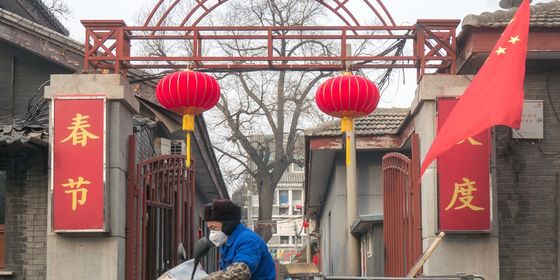Dramatic figures of speech born from Peking Opera
Choice Chengyu is a regular column, examining interesting, unique or newsworthy examples of chengyu—four-character idioms or proverbs, derived from historical and mythical events.
October 22 is the birthday of late Peking Opera performer Mei Lanfang. Born in 1894, Mei was known as one of the “Four Great Dan” of Peking Opera, with dan referring to performers of female roles.
Mei began to study Peking Opera at the age of 8 and made his debut at 11. After he joined the Xiliancheng Theatrical Company at 13, he soon became popular in Shanghai and gained a national reputation. After the break of the War of Resistance against Japan, he went to settle in Hong Kong, but came back to Shanghai later in his life.
Throughout his career, he played many classic roles on stage, including Bai Niangzi in Broken Bridge, Concubine Yu in Farewell My Concubine, and Yang Yuhuan in The Drunken Concubine. For many fans, Mei’s name is practically synonymous with Peking Opera. The art form, regarded as one of China’s “national essences,” played an important role in Chinese people’s cultural life, and has given birth to many chengyu. Today, let’s introduce some idioms generated from Peking Opera to celebrate Master Mei’s birthday.
梨园子弟 Children of the pear garden
In the Tang dynasty (618-907), Emperor Xuanzong trained court musicians in an imperial pear garden. In later dynasties, the term “children of the pear garden” gradually became a byword for theatrical troupes. Thus, this chengyu refers to actors or actress in traditional Chinese operas, and is often used in formal writing.
Today’s performers in the pear garden don’t work as hard as before.
Xiànzài de líyuán zǐdì bú xiàng guòqù nàme yònggōng le.
现在的梨园子弟不像过去那么用功了。
唱念做打 Singing, recitation, acting, and acrobatics
This chengyu introduces the four basic skills of a Chinese opera performer.
As a famous Peking Opera performer, he is masterful at the skills of singing, recitation, acting, and acrobatics.
Zuòwéi yìmíng zhīmíng de jīngjù yǎnyuán, tā chàngniàn zuòdǎ yàngyàng jīngtōng.
作为一名知名的京剧演员,他唱念做打样样精通。
插科打诨 Making impromptu comic gestures and remarks
Originally, this chengyu referred to an opera performer’s comic acts, but now it describes general jesting and buffoonery.
Old Zhang is so fond of jesting and making gags.
Lǎo Zhāng zhège rén jiù xǐhuān chākē dǎhùn.
老张这个人就喜欢插科打诨。
粉墨登场 To powder one’s face and go on stage
This chengyu originally described opera performers putting on a show, but later, it became a derogatory phrase often used on politicians.
With the backing of the invaders, the puppet government hurriedly assumed office.
Zài qīnlǜèjūn de fúzhí xià, kuílěi men cōngcōng mángmáng de fěnmò dēngchǎng le.
在侵略军的扶植下,傀儡们匆匆忙忙地粉墨登场了。
有板有眼 With downbeats and upbeats
The music of traditional opera has a certain mode structure—in Peking Opera, a downbeat is called 板 (bǎn), and an upbeat is called 眼 (yǎn). Thus, this term means the music is rich in levels and follows an organized structure. Today, it describes people who speak in a rhythmic, measured, and orderly manner.
What he said was so well-argued, people couldn’t help but take his word for it.
Tā shuō de yǒubǎn yǒuyǎn de, jiàorén bùdé búxìn.
他说得有板有眼的,叫人不得不信。
一板一眼 A downbeat and an upbeat
This chengyu describes people who follow a prescribed pattern in speech or action, or do something very meticulously.
He explained the idea for improving business management in scrupulous detail.
Tā yìbǎn yìyǎn de jiěshì le gǎijìn jīngyíng fāngfǎ de yìjiàn.
他一板一眼地解释了改进经营方法的意见。
荒腔走板 Singing out of tune and off the beat
Rather self-evidently, this idiom can be used to describe a failed singing performance.
He sang this song totally out of key.
Zhè shǒu gē bèi tā chàng de huāngqiāng zǒubǎn de.
这首歌被他唱得荒腔走板的。
南腔北调 Southern tone and northern melody
Originally this idiom refers to different opera melodies from different regions; today, it describes a medley of northern and southern accents.
Workers in this office come from different areas, so they speak with different accents.
Bàngōngshì lǐ nǎr de rén dōu yǒu, shuōhuà nánqiāng běidiào de.
办公室里哪儿的人都有,说话南腔北调的。












